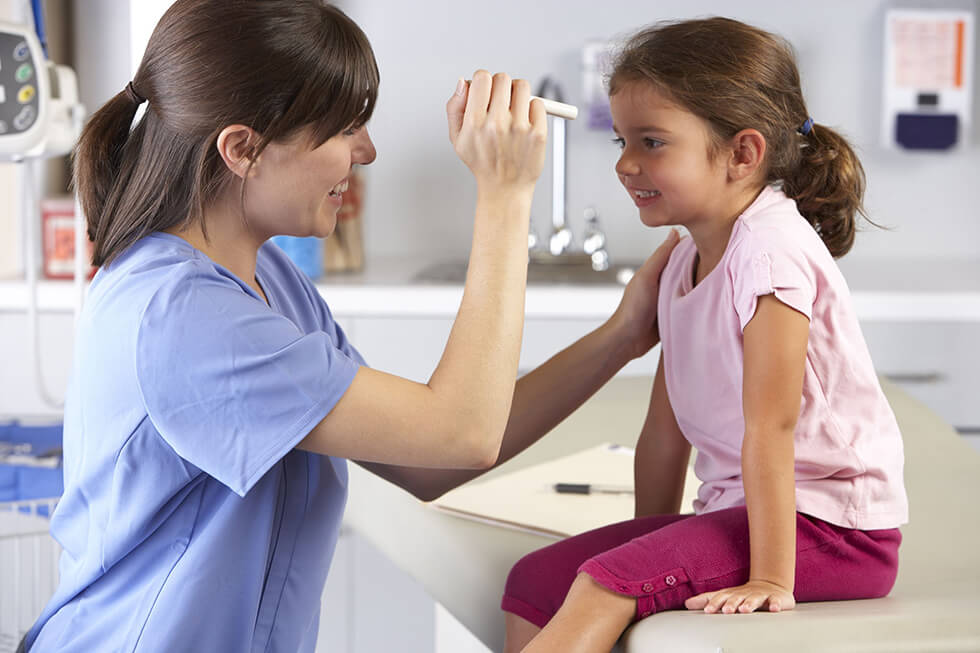- BSN Programs
- BSN Programs by State
- Alabama
- Alaska
- Arizona
- Arkansas
- California
- Colorado
- Connecticut
- Delaware
- Florida
- Georgia
- Hawaii
- Idaho
- Illinois
- Indiana
- Iowa
- Kansas
- Kentucky
- Louisiana
- Maine
- Maryland
- Massachusetts
- Michigan
- Minnesota
- Mississippi
- Missouri
- Montana
- Nebraska
- Nevada
- New Hampshire
- New Jersey
- New Mexico
- New York
- North Carolina
- North Dakota
- Ohio
- Oklahoma
- Oregon
- Pennsylvania
- Rhode Island
- South Carolina
- South Dakota
- Tennessee
- Texas
- Utah
- Vermont
- Virginia
- Washington
- West Virginia
- Wisconsin
- Wyoming
- Online BSN Programs
- BSN Bridge Programs
- Blog
- Find BSN Programs

One of the many advantages of becoming a registered nurse is that you can take your career into so many different directions. If you love kids or discover that you really enjoy working with them after getting into the field, pediatric nursing may be right for you. By learning about pediatric nursing is now, including what it entails and how to get there, you can more effectively plan your future.
Table of Contents[hide]
What is Pediatric Nursing?
As the name implies, pediatric nursing involves providing medical care to children and adolescents. Pediatric nurses primarily care for people who are between the toddler years and 18 years of age. Pediatric nurses provide both preventive care and acute care, which means that they help to diagnose and treat illnesses and injuries. Pediatric nurses are registered nurses, or RNs, who have accrued enough experience working with children that they are able to earn their certification in pediatric nursing. Pediatric nurses are essential because providing healthcare to children and adolescents differs considerably from providing such care to adults, seniors and infants.
Job Duties of Pediatric Nurses
In many ways, pediatric nurses' typical job duties closely mirror those of regular registered nurses. That is to say that they provide both acute care and primary care.
Examples of the types of acute care services that pediatric nurses provide include:
- providing in-depth physical assessments;
- ordering medications;
- interpreting lab and diagnostic test results;
- and performing therapeutic treatments for acutely, critically or chronically ill patients.
Examples of the types of primary care services that are provided by pediatric nurses include:
- performing well child exams and providing preventive care;
- performing school physicals;
- administering immunizations;
- and diagnosing and treating illnesses.
Like RNs, pediatric nurses tend to work long shifts, and no two days are ever exactly alike. The typical workday varies depending on the setting and the patients.
Where Do Pediatric Nurses Typically Work?
Pediatric nurses work in a wide variety of different healthcare settings. Not surprisingly, they often work in schools and in other academic settings where children and adolescents are found. However, they also work in most of the same settings as registered nurses, including hospitals, private practices, urgent care clinics, specialty medical offices and surgical centers.
Education and Training for Becoming a Pediatric Nurse
If you'd like to break into pediatric nursing, the first step is to get your nursing license. There are technically two ways to go about doing this. You can either earn a two-year associate degree in nursing, or ADN, or a four-year bachelor of science in nursing, or BSN. If you want to become a pediatric nurse, you should go ahead and earn your BSN. The vast majority of pediatric nurses have BSNs, and most employers expect them.
Once you have finished nursing school, you must take and pass the NCLEX-RN to earn your RN license. Next, try to get a job in a setting that focuses primarily on caring for children and adolescents. It is crucial to get some experience in working with these types of patients.
To qualify for the best jobs and the best pay, you will also want to obtain your pediatric nursing certification. This is available through the Pediatric Nursing Certification Board. You must sit for an exam to obtain your certification. Once you do, you will officially be a Certified Pediatric Nurse, or CPN, and you will be eligible to apply for pediatric nursing positions.
Specializations in Pediatric Nursing
Pediatric nursing is itself a specialized type of nursing. Within the pediatric nursing field, there are numerous additional specializations that you can branch out into. Examples include pediatric cardiology, pediatric oncology and pediatric gastroenterology.
Most of the time, nurses progress into pediatric specializations after acquiring some experience in those areas. For example, you may find yourself gravitating toward providing certain types of services to children and adolescents. In fact, this is why it pays to be adventurous during your training and to try to expose yourself to as many different specialization areas as possible. After identifying a specialization that appeals to you, gain as much experience in that area as you can to ensure that you can easily find jobs in that field later.
Pediatric RN versus Pediatric Nurse Practitioner
With a BSN and a certification from the Pediatric Nursing Certification Board, you can become a pediatric nurse. You will essentially have the same qualifications as a typical RN. However, you may decide that you want to provide even more in-depth care. You might even want to open your own practice someday. To make this happen, you should consider earning your master of science in nursing, or MSN, with a specialization in pediatric nursing. By doing so, you will progress into being a pediatric nurse practitioner, or PNP, and it will open up many more doors for you.
Pediatric Nursing Job Outlook and Salary
As with virtually every branch of nursing, the outlook for pediatric nursing is excellent. While aging baby boomers are expected to keep geriatric nurses busy for the foreseeable future, many additional pediatric nursing jobs are expected to become available over the next 10 years or so.
As for salary, it varies depending on geography and other factors. It also depends on whether you become a pediatric nurse or a pediatric nurse practitioner, or PNP. According to the Bureau of Labor Statistics, the median annual salary for a pediatric nurse is $66,640. Meanwhile, the median annual salary for a pediatric nurse practitioner is $102,670. While you will have to complete a lot of extra schooling to become a PNP, it will pay off considerably in terms of job prospects and compensation.
To become a pediatric nurse, you don't just have to jump through certain hoops to earn the title. You also need to genuinely love working with children and adolescents. As long as you do, you are sure to have a long, fruitful career in this field.



